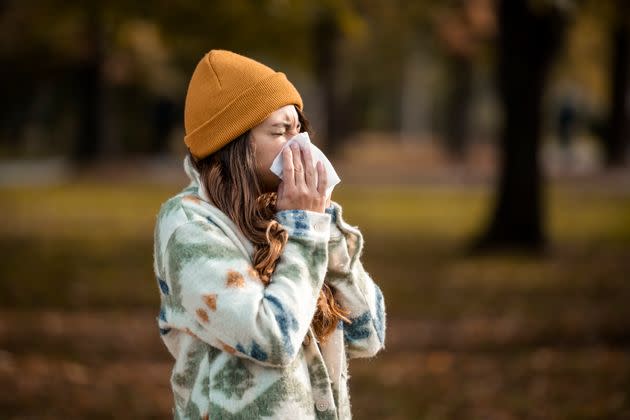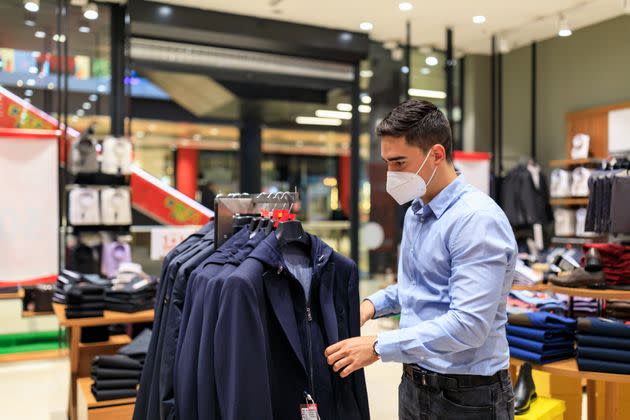What The CDC's New COVID Isolation Rules Mean For You
- Oops!Something went wrong.Please try again later.

The Centers for Disease Control and Prevention changed its COVID-19 isolation guidance, marking a shift from how we currently attempt to prevent the spread of the illness.
The new guidance states that people who test positive for COVID can end isolation if they’ve been fever-free without medication for 24 hours and have mild, improving symptoms. Additionally, for at least five days after isolation ends, it’s encouraged that you wear a mask, stay away from others, practice good hygiene, take COVID tests and keep air filtration in mind by opening windows and gathering outdoors.
The CDC notes that this change makes the guidance for respiratory virus care more streamlined; these guidelines currently apply to the flu, RSV and other respiratory viral illnesses as well.
Note that this change does not apply to nursing homes and healthcare facilities.
Prior to this change, COVID guidance instructed folks to isolate for at least five days when they test positive. The guidance change comes sooner than previously expected. Last month, it was reported that guideline changes were not predicted to happen until April.
Regardless, this is a big transition from the former protocols. While some would argue that it’s dangerous, others also point out that not everyone can afford isolation. Here’s what infectious disease experts think of the change:
These guidelines rely on personal responsibility and prior immunity.
“In general ... we shouldn’t go to work when we’re sick, and so what this proposed change would do ― in my view ― is normalize COVID, along with other respiratory viral infections like influenza or RSV, or the many other viruses that can cause respiratory illness,” said Dr. Mark J. Mulligan, the director of the NYU Langone Vaccine Center.
Mulligan stressed that it’s our personal responsibility to be honest about our symptoms and to not go out in public if we’re sick. Even once you’ve improved, the guidelines say you should still take precautions like wearing a mask and gathering outdoors for five days post-isolation.
“Once we’ve not had fever for a day or so and if our symptoms are improving and mostly mild, it’s reasonable to go back,” he said.
Additionally, this change takes into account the immunity many people have from vaccination, previous COVID infection or both, he said.
“We are likely to be protected against severe disease, hospitalization and death — when the pandemic started in the early phases, when most of us did not have any immune protection, that was not the case,” Mulligan said. “We built up a level of community immunity where I think something like this is reasonable to be discussing.”
The change addresses the fact that many people can’t always stay home from work for five days.
“It’s certainly a difficult decision, I understand. We have changed a lot since 2021 in how we approach this virus,”said Dr. Kristin Englund, a staff member of the department of infectious disease at Cleveland Clinic. “We do now have effective vaccines against it — not that we use vaccines to replace masking and isolation — but it certainly helps to control the amount of virus that’s in our communities to the point now where we can consider a little bit more freedom from the previous isolation policy.”
Additionally, with more and more people relying on at-home testing as opposed to testing at a doctor’s office, it makes it harder for people to isolate, Englund said.
“Workplaces may not be as willing to accept an at-home test as they would from, say, getting it from a hospital and getting a physician’s note. So, it’s difficult for people to actually conform to that at-home isolation policy nowadays,” she said.
This new guidance could discount severe outcomes and those who are high-risk.
In response to the potential guideline change, Dr. Richard A. Martinello, a Yale Medicine infectious diseases physician, said he’s “a bit torn.”
“While we have seen both less COVID circulating this year and a lower severity of disease, COVID remains [the cause of] significant illness, with some persons experiencing complications such as severe disease requiring hospitalization or long COVID,” he said.
Although many recover just fine from COVID, that is not the case for everyone. Mulligan said that “people with weak immune systems may not have immunity like most of us; that is, even if they got the vaccine, even if they’ve had past COVID, they may not have mounted a protective immune response.”
“Therefore, this is a significant group in society that will be put at increased risk, potentially, if the proposed change is instituted,” Mulligan added, which makes it crucial that folks understand their personal responsibility when it comes to virus spread.
“People need to know that there is still risk and that there are additional actions which can be taken to reduce this risk,” Martinello said. “These actions include staying home when sick, masking, vaccination, testing and optimizing indoor air quality.”
Englund noted that those who are high-risk should stay up-to-date on all vaccines, including COVID, flu and RSV shots. Loved ones need to do the same so viruses won’t be passed on. In indoor spaces where you can’t maintain social distancing, wear a mask and use hand sanitizer, she added.

Masking should become the norm again.
“My hope is certainly that based upon what we’ve been through, masking becomes more of a norm,” Englund said. “I know a lot of people have stopped wearing masks, but I think we see other countries where masking is very commonplace for them and I think it needs to be something that is not stigmatized here in the U.S.”
If you don’t feel well and need to go out, wear a mask so you don’t spread whatever virus to your community, coworkers or loved ones.
“It simply shows that you’re caring for somebody else’s health and safety ... this just needs to be something that we accept in this society,” Englund said.
And the new CDC guidance recommends masking for the five days after your isolation.
Just because the guidelines are less strict doesn’t mean COVID is gone.
“I certainly think that COVID is here to stay ... I think the country and the world needs to understand that just because it’s not on the news all the time, COVID can be deadly,” Englund said.
It’s important to stay aware and do all that you can to protect yourself and your community, which means getting vaccinated, wearing a mask if you feel ill and staying away from those who are immunocompromised.
Englund also said that although lockdown isolation is gone, we need to “be able to rely on people to do the right thing and stay home” when we’re not feeling well.
All in all, the guidelines address the changing views of COVID.
Martinello said that “this is yet another sign that we are transitioning from the pandemic to a new period where COVID is considered an endemic disease. Being an endemic disease in no way means that it is insignificant.”
As an example, Martinello highlighted how influenza is endemic and has a significant impact on the health of people living in the U.S., with tens of thousands of Americans dying of the flu each year.
“I think the pandemic has taught us that we were perhaps too accepting of viral respiratory infections in the past and that there are actions we can take to decrease the risk [of] us [getting] sick,” he said.
While views on COVID are shifting, it’s important to remember that a segment of society is still at higher risk. Just because the guidance changes doesn’t mean members of your community are not at risk.
“Looking back to our pre-pandemic time, we were too accepting of the risk for illness. We can stay healthier by getting vaccinated, using masks and improving indoor air quality,” Martinello said.
This story has been updated.
